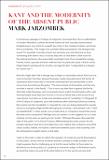Kant and the Modernity of the Absent Public
Author(s)
Jarzombek, Mark
DownloadPublished version (230.3Kb)
Terms of use
Metadata
Show full item recordAbstract
In his famous passages in Critique of Judgment, Immanuel Kant, the so-called father
of modern liberalism, outlines the three maxims of how a society moves toward
Enlightenment: one, think for oneself; two, think in the mindset of others; and three,
think consistently. The longer one considers these propositions, the stranger they
sound. For example, if we take maxim two seriously, we could become so busy
connecting with others—and, of course, they with us—that there is little room for
that special someone, who presumably would get most of our empathetic energy.
Friends, lovers, spouses and even relatives have no particular place in Kant’s world.
Hegel stated it perhaps all too bluntly; marriage for Kant “is degraded to a bargain
for mutual use.”
Date issued
2013-01Department
Massachusetts Institute of Technology. Department of Linguistics and PhilosophyJournal
Thresholds
Publisher
MIT Press - Journals
Citation
Jarzombek, Mark. "Kant and the Modernity of the Absent Public." Thresholds 41, Spring 2013 (January 2013): 74-81 © The Author
Version: Final published version
ISSN
1091-711X
2572-7338